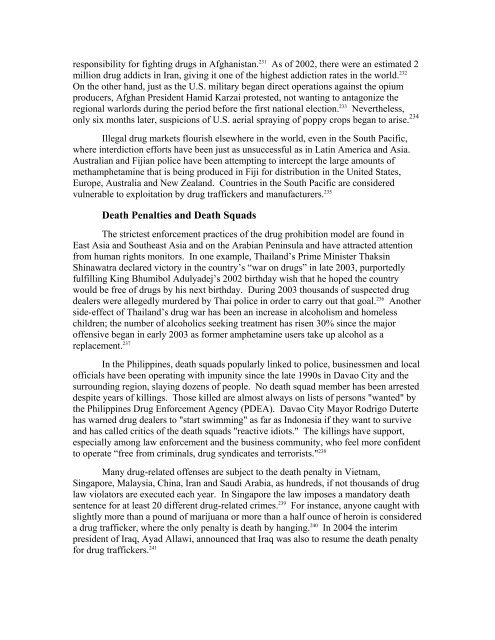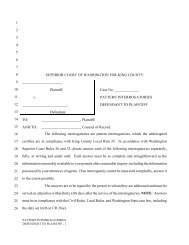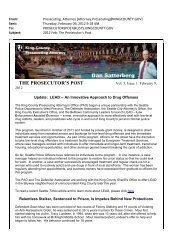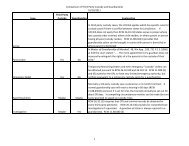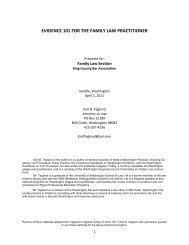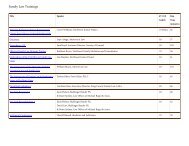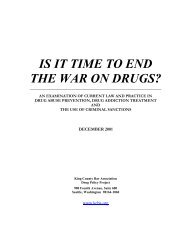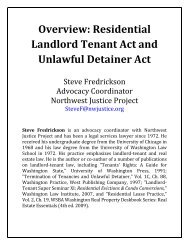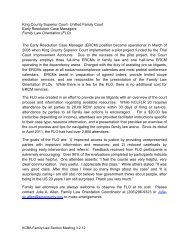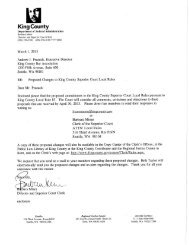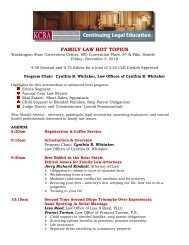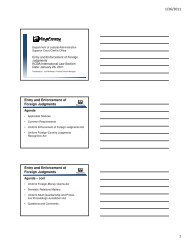Effective Drug Control: Toward A New Legal Framework
Effective Drug Control: Toward A New Legal Framework
Effective Drug Control: Toward A New Legal Framework
You also want an ePaper? Increase the reach of your titles
YUMPU automatically turns print PDFs into web optimized ePapers that Google loves.
esponsibility for fighting drugs in Afghanistan. 231 As of 2002, there were an estimated 2<br />
million drug addicts in Iran, giving it one of the highest addiction rates in the world. 232<br />
On the other hand, just as the U.S. military began direct operations against the opium<br />
producers, Afghan President Hamid Karzai protested, not wanting to antagonize the<br />
regional warlords during the period before the first national election. 233 Nevertheless,<br />
only six months later, suspicions of U.S. aerial spraying of poppy crops began to arise. 234<br />
Illegal drug markets flourish elsewhere in the world, even in the South Pacific,<br />
where interdiction efforts have been just as unsuccessful as in Latin America and Asia.<br />
Australian and Fijian police have been attempting to intercept the large amounts of<br />
methamphetamine that is being produced in Fiji for distribution in the United States,<br />
Europe, Australia and <strong>New</strong> Zealand. Countries in the South Pacific are considered<br />
vulnerable to exploitation by drug traffickers and manufacturers. 235<br />
Death Penalties and Death Squads<br />
The strictest enforcement practices of the drug prohibition model are found in<br />
East Asia and Southeast Asia and on the Arabian Peninsula and have attracted attention<br />
from human rights monitors. In one example, Thailand’s Prime Minister Thaksin<br />
Shinawatra declared victory in the country’s “war on drugs” in late 2003, purportedly<br />
fulfilling King Bhumibol Adulyadej’s 2002 birthday wish that he hoped the country<br />
would be free of drugs by his next birthday. During 2003 thousands of suspected drug<br />
dealers were allegedly murdered by Thai police in order to carry out that goal. 236 Another<br />
side-effect of Thailand’s drug war has been an increase in alcoholism and homeless<br />
children; the number of alcoholics seeking treatment has risen 30% since the major<br />
offensive began in early 2003 as former amphetamine users take up alcohol as a<br />
replacement. 237<br />
In the Philippines, death squads popularly linked to police, businessmen and local<br />
officials have been operating with impunity since the late 1990s in Davao City and the<br />
surrounding region, slaying dozens of people. No death squad member has been arrested<br />
despite years of killings. Those killed are almost always on lists of persons "wanted" by<br />
the Philippines <strong>Drug</strong> Enforcement Agency (PDEA). Davao City Mayor Rodrigo Duterte<br />
has warned drug dealers to "start swimming" as far as Indonesia if they want to survive<br />
and has called critics of the death squads "reactive idiots." The killings have support,<br />
especially among law enforcement and the business community, who feel more confident<br />
to operate “free from criminals, drug syndicates and terrorists." 238<br />
Many drug-related offenses are subject to the death penalty in Vietnam,<br />
Singapore, Malaysia, China, Iran and Saudi Arabia, as hundreds, if not thousands of drug<br />
law violators are executed each year. In Singapore the law imposes a mandatory death<br />
sentence for at least 20 different drug-related crimes. 239 For instance, anyone caught with<br />
slightly more than a pound of marijuana or more than a half ounce of heroin is considered<br />
a drug trafficker, where the only penalty is death by hanging. 240 In 2004 the interim<br />
president of Iraq, Ayad Allawi, announced that Iraq was also to resume the death penalty<br />
for drug traffickers. 241


